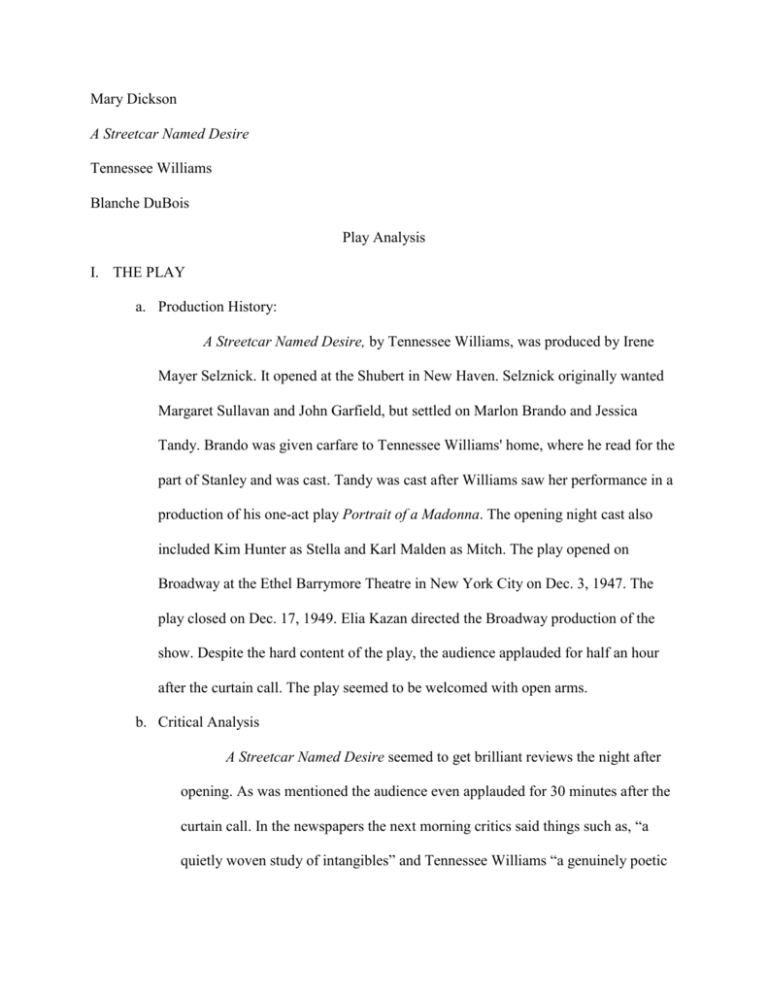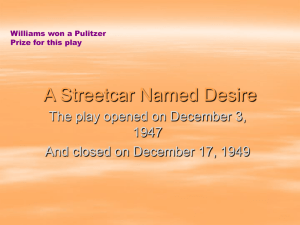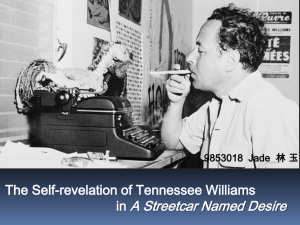Play Analysis Example
advertisement

Mary Dickson A Streetcar Named Desire Tennessee Williams Blanche DuBois Play Analysis I. THE PLAY a. Production History: A Streetcar Named Desire, by Tennessee Williams, was produced by Irene Mayer Selznick. It opened at the Shubert in New Haven. Selznick originally wanted Margaret Sullavan and John Garfield, but settled on Marlon Brando and Jessica Tandy. Brando was given carfare to Tennessee Williams' home, where he read for the part of Stanley and was cast. Tandy was cast after Williams saw her performance in a production of his one-act play Portrait of a Madonna. The opening night cast also included Kim Hunter as Stella and Karl Malden as Mitch. The play opened on Broadway at the Ethel Barrymore Theatre in New York City on Dec. 3, 1947. The play closed on Dec. 17, 1949. Elia Kazan directed the Broadway production of the show. Despite the hard content of the play, the audience applauded for half an hour after the curtain call. The play seemed to be welcomed with open arms. b. Critical Analysis A Streetcar Named Desire seemed to get brilliant reviews the night after opening. As was mentioned the audience even applauded for 30 minutes after the curtain call. In the newspapers the next morning critics said things such as, “a quietly woven study of intangibles” and Tennessee Williams “a genuinely poetic playwright whose knowledge of people is honest and thorough.” The public seemed to like that the play dealt with real issues that were being faced every day. But when there is good, there is also bad. Critics also thought that the material was too risky for an audience’s eyes, and that Williams was being pessimistic about human existence. To this day this play is being studied in schools and performed, so it has kept the good reviews and overcome the bad. Tennessee Williams and this play are both highly respected. II. THE PLAYWRIGHT a. Biographical Information Thomas Lanier Williams was born on March 26, 1911 in Columbus, Mississippi. He was the second of three children. His parents often engaged in violent arguments. In 1929 Thomas was admitted to the University of Missouri, where he saw a production of Ghosts, and decided to become a playwright. His father forced him to leave college and work at the International Shoe Company. He worked there with a man named Stanley Kowalski who inspired his character for A Streetcar Named Desire. Tom later returned to school and graduated from the University of Iowa. Tom later met and fell in love with Frank Merlo in 1947 while living in New Orleans. But in 1961, Merlo died of lung cancer and the playwright went into a deep depression that lasted ten years. In fact, Williams struggled with depression throughout most of his life and lived with the constant fear that he would go insane, as did his sister Rose. For much of this period, he battled addictions to prescription drugs and alcohol. On February 24, 1983, Williams choked to death on a bottle cap at his New York City residence at the Hotel Elysee. He is buried in St. Louis, Missouri. Everything that happened in his life is in his plays. His plays represent his life. b. Career History After Tom graduated from college he had a couple of plays produced by the Mummers of St. Louis. When his plays weren’t accepted by the public in Chicago, Tom moved to New Orleans and changed his name to Tennessee. In 1939, the Williams received a $1,000 Rockefeller Grant, and a year later, Battle of Angels was produced in Boston. In 1944 The Glass Menagerie had a very successful run in Chicago and a year later made its way onto Broadway. The Glass Menagerie won the New York Drama Critics' Circle Award for best play of the season. Williams had several other Broadway hits including A Streetcar Named Desire, Summer and Smoke, A Rose Tattoo, and Camino Real. He received his first Pulitzer Prize in 1948 for A Streetcar Named Desire. Williams had many of his plays made into motion pictures including A Streetcar Named Desire, The Glass Menagerie, Cat on a Hot Tin Roof, Orpheus Descending, and Night of the Iguana. Tennessee Williams’ work is cherished by many people, and he is thought to be one of the greatest playwrights. His plays are full of real life happenings, most of which he took from his own life. The audience can connect to the characters easily. III. THE WORLD OF THE PLAY c. Environmental Facts i. Geographical Information- French Quarter, New Orleans, Louisiana. Elysian Fields between the L&N tracks and the river. House with two flats. Old and rickety. ii. Spring, May 4th, 1946. d. Economic Environment- WWII had just ended so women in the USA were holding jobs, but as soon as the men started coming home they took the work they could find, forcing women back into the homes. There were a lot of job openings because new technology was being discovered, and African American men demanded jobs now. The economy was rebounding from the Depression so business was thriving. In the World of The Play the economy was different. Stella and Stanley live in poor town, but they make do. Stanley works in a factory and Stella stays at home. They have enough money to support themselves and the baby on the way, but when Blanche comes they struggle to make ends meet. Stanley knows that Blanche is no good for their money supply when he opens her trunk and says, “Where are your pearls and gold bracelets?” (36). e. Political Environment- The biggest event in 1940’s politics was WWII. The United Nations Charter was established about a year before Scene 1 takes place. Harry S. Truman was the President. The Democratic Party was in control of the country. Politics aren’t a very big part of the World of the Play. The major issues being debated were still racial issues and now sexual orientation and gender role issues were being brought up. Gender roles play a big part in this play. Stanley assumes the role of being in charge of all and even brings up the Napoleonic Code, “whatever belongs to my wife is also mine” (40). f. Social Environment- The baby boom was a big thing happening in the 1940’s. The men came home from war and immediately started families. This relates to Stella becoming pregnant. Men still held power over women, and could do pretty much whatever they pleased and the women stuck by their sides. There was a high class and there was a lower class. Blanche thinks she is high class, and Stanley and Stella are low class. The high class expected proper etiquette from the lower classes, but were disappointed. Blanche looks down on the fact that Stanley is Polish. She refers to him as a “Polack”. Stanley doesn’t like this. Race and religion don’t play a huge difference in the play’s world. III. Previous ActionStella and Blanche grew up at Belle Reve. They never were extremely rich but their family did well when they were growing up. Stella moves away and meets Stanley. They get married and get pregnant. Blanche has to stay at Belle Reve and watch all of her family members die. Blanche doesn’t know how to handle money well so she loses Belle Reve. Blanche, a high school English teacher, has an inappropriate relationship with a student of hers and is told to take a leave of absence. Blanche is run out of town for all of the deceitful things she has done and takes a streetcar named Desire to Stella’s home. She has prepared another story of her trip to New Orleans and the loss of Belle Reve to tell Stella upon her arrival. The play begins. IV. POLAR ATTITUDESStanley Kowalski- Stanley, although a rough man in the beginning, becomes even more rough as the play goes on. Blanche starts a fire in him, and in the end he refuses to deal with her anymore. When meeting her he tries to have a nice conversation with her asking Blanche questions such as, “Where are you from?” and offers her a shot (29). He is trying to be personable. But she ends up stepping on all of his toes until he breaks, first talking behind her back to Stella but then snapping to Blanche’s face saying, “There isn’t a goddam thing but imagination!” (127). Stanley knows his life will be happier if it consists of just Stella and the baby and Blanche isn’t there to poison it. Blanche DuBois- I don’t believe that Blanche grows as a person for the better in this play. Sure Blanche has great qualities, she sees Stella being treated horribly and she acts like any sister would to protect her. But Blanche is a liar in the beginning, and a liar in the end. I don’t even think Blanche knows that she is lying. All of her lies have become truth to her. Blanche learns at the very end of the play that it would have been better to tell the truth, but that is after the fact, when she is being taken away. She has one of the greatest learning lines though. When Blanche says, “I have always depended on the kindness of strangers” shows that she doesn’t know how to depend on anyone because in the end everyone lets her down (142). Even though she causes them to let her down, they always let her down and leave her alone. Stella Kowalski- All of her life Stella has been used to sticking up for Blanche and blending into the background. Whenever anyone inquires about Blanche’s weird behavior Stella makes up a cover story for her. In Scene 7 Stella says, “Stanley stop picking on Blanche” and “Blanche is sensitive” (98.) Stella lets Blanche walk all over her, but in the end Stella learns to do what is best for Blanche instead of babying her. Stella sends Blanche with a doctor to work out Blanche’s issues. She does what any sister would and does the right thing. Stella says Blanche is “Going on a vacation” (135). She panics because of her decision, but Stella is able to let Blanche go. Harold Mitchell (Mitch)- Mitch just wants to find a woman that he can bring home to please his mother. His mother is the most important thing in his life and that becomes apparent towards the end. Mitch finds Blanche to be a beautiful mysterious woman in the beginning. He says things like, “You may teach school but you’re certainly not an old maid” (56). He doesn’t question Blanche. He believes she is an honest person. After Mitch finds out the truth about Blanche he doesn’t try to look good for her. He comes to Stella’s house to find out the truth. When Blanche won’t turn on the light he forces her to so he can “take a look at her good and plain” (117). Mitch realizes that she is phony and he can’t replace his mother when she dies with Blanche. He leaves Blanche and goes back to caring for his mother. Mitch has realized what is important for him in life. V. IDEA OF THE PLAYa. Meaning of the Title- The title tells the audience or the reader that this play is going to have something to do with desire, wanting something badly. Desire is bigger than want. A person wants a lot of things; desire can be tasted and smelled. I think that Williams chose the title A Streetcar Named Desire because in the end desire can destroy a person. Desire can make a person forget about what is important. Desire is greedy. Most of the characters in the show want, want, want, but never receive. They are never satisfied. The streetcar takes us where we want to go, but we will never be satisfied. b. Meaning of the play- Williams wants the audience to understand the effects that desire has on a person. There is violence, harsh words, and rape in the context of the play. Desire is human and part of life and felt by everyone, but can damage anyone who takes desire too far. Maybe Williams had a problem with desire, so he wanted to teach a lesson. Williams wrote this play because he dealt with issues in the script in his own life, and wanted to educate and entertain the public. VI. RESEARCH TOPICS Tennessee Williams. http://www.imagi-nation.com/moonstruck/clsc9.html. Goodwin, Sue. American History- Decade 1940-1949. Lone Star College-Kingwood Library. July 2009. Web. 01/15/2011. A Streetcar Named Desire- anything that can be found on the play. Other works of Tennessee Williams. Other works being produced and written at the time.







